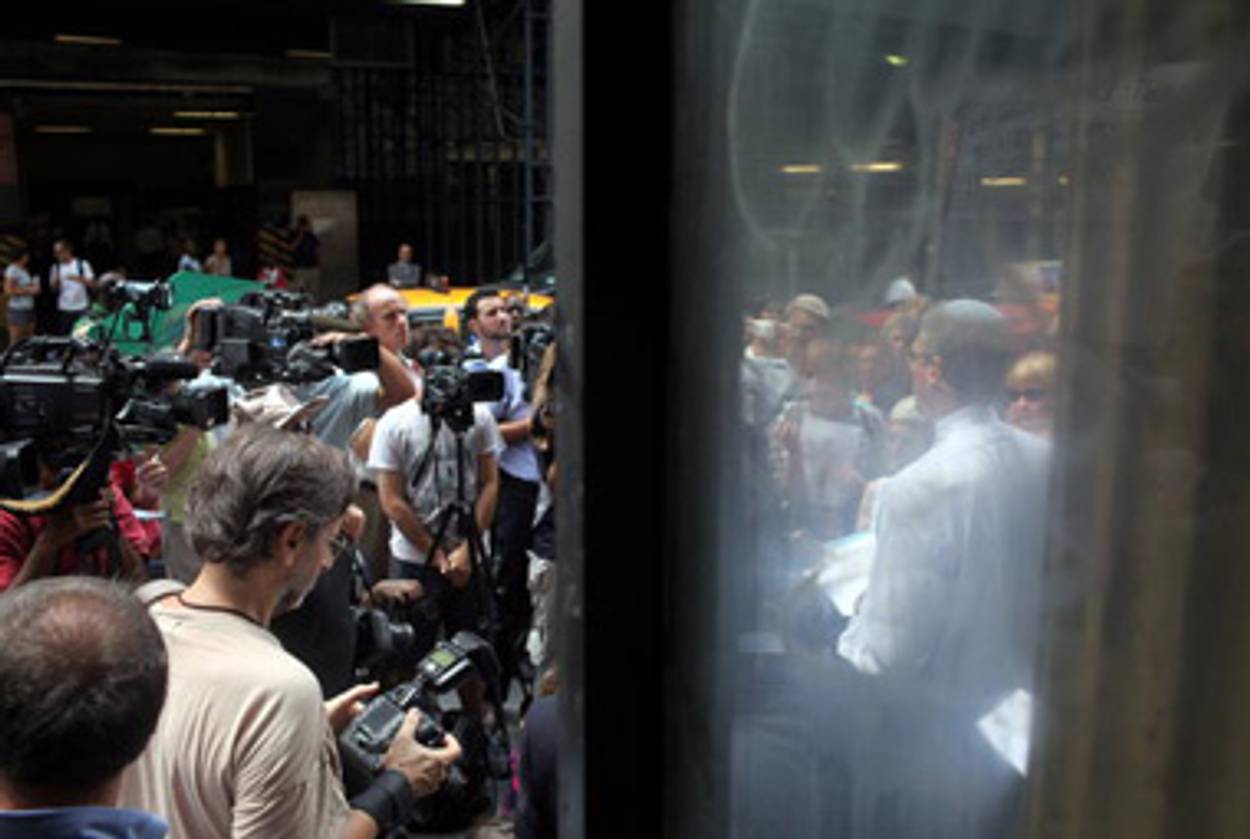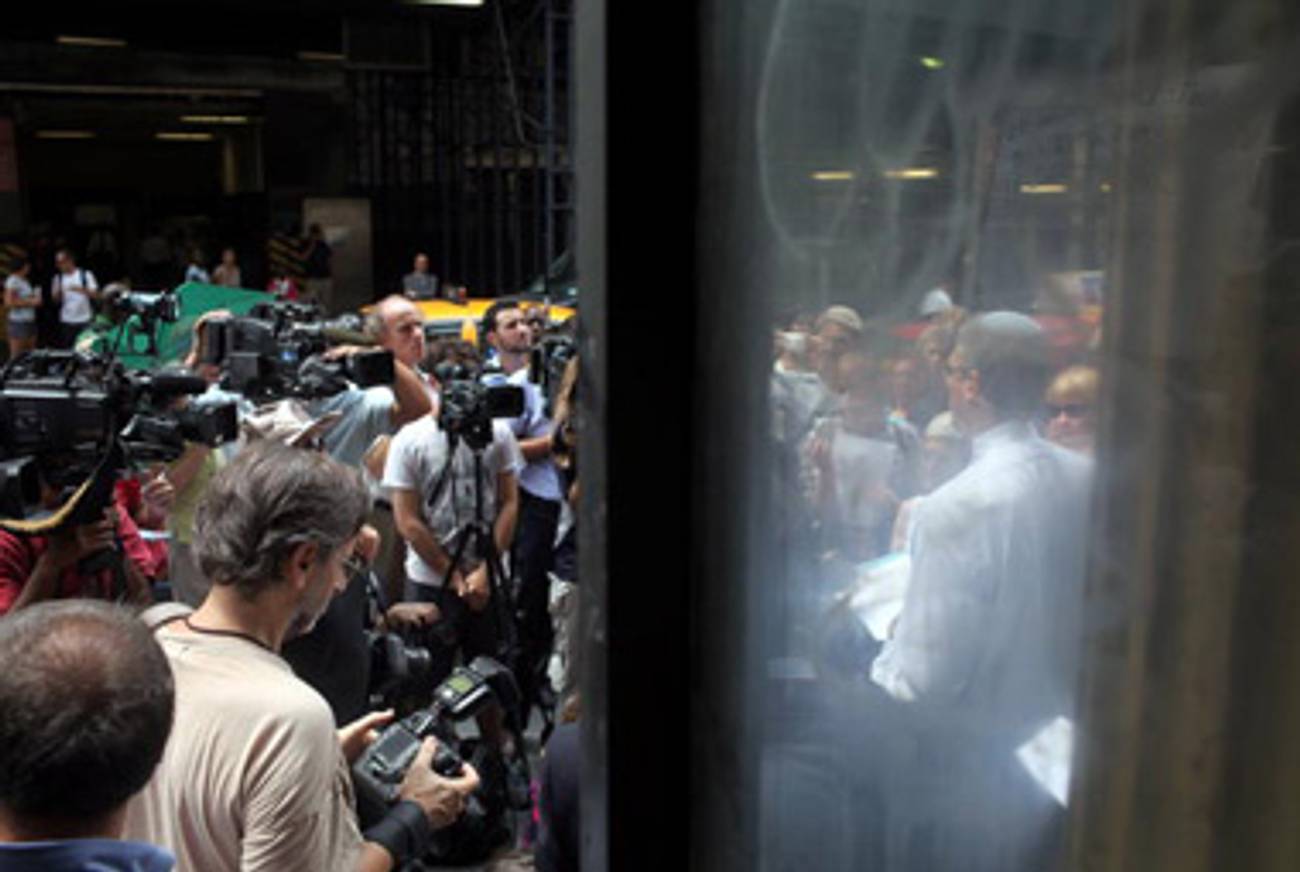How To Build a $100 Million Islamic Center
Legal hurdles cleared; but where’s the money coming from?




Left to scrapping together futile legal challenges, opponents of the Islamic center to be located near Ground Zero are turning to this query: Will it receive support from extremist organizations? Dan Senor, a former Bush administration official, informed potential financiers earlier this week that anyone who partners with Cordoba House “needs to know there is going to be a real stigma.” Even supportive groups refer to the cost. “With a $100 million price tag,” David Harris, the American Jewish Committee Director, asks, “what are the exact sources of funding?”
Imam Feisal Abdul Rauf and Daisy Khan are the couple behind the American Society for Muslim Advancement (ASMA) and the Cordoba Initiative, the latter of which held a noon event yesterday flaunting its supporters, many of them Jewish. The Cordoba Initiative is not wealthy. As of 2008, according to tax files, its net assets were $18,255. ASMA has deeper pockets, with an annual intake of nearly $1 million, according to its 2009 filing [pdf]. It received substantial grants from the United Nations Population Fund, a Dutch Fund for gender equality, as well as standard U.S. philanthropy groups. Nearly half of its funding, though, comes from the Qatari government. (The building was actually purchased by SoHo Properties, a private real estate company run by Sharif el-Gamal, a congregant of the imam.)
This obviously leaves the center well short of its ambitious fundraising goal. Oz Sultan, a spokesman for the new nonprofit that will take charge of the fundraising effort, called Park51, told me that fundraising efforts were “super-nascent right now.” Funds will arrive, he said, “from a variety of different sources,” including grants, bond issues, and private contributions. Arts funding are a possibility, he shared, noting Park51’s aspirations to create a city structure on par with the Guggenheim. “There’s not going be minarets,” he added.
Park51 intends to have an interfaith board. Sultan could not offer specifics, but noted the ongoing involvement of the Cordoba Initiative, which he called the “programming and interfaith head of the project.” In their search for funds, they will likely turn, in part, to their existing relationships and networks.
Sayyed Nadeem Kazmi is an adviser to the Cordoba Initiative with a resume, like Imam Feisal’s, steeped in NGO and government work spanning continents. In addition to work with the U.S. State Department and British government, Kazmi has served with a host of interfaith organizations here and abroad. His bio lists work with the Open Society Institute, the liberal organization led by George Soros. (An OSI spokesperson confirmed that Kazmi had been a consultant.) For five years, he was a senior adviser to Prince Hassan bin Talal of Jordan.
In an interview with the Wall Street Journal, Daisy Khan said Park51 would not rule out receiving funds from foreign governments. Politicians pounced on this possibility. Rep. Peter King (R-New York) and Rick Lazio, a Republican gubernatorial candidate, have called for investigations into the funding, which Mayor Bloomberg dismissed as “un-American.” (King’s charge packs less of a punch since he has fiscally supported actual terrorist outfits.)
Park51, Sultan insisted, will fully comply with state and federal investment regulations. “If anyone doesn’t fit with what the Treasury or Homeland Security [Departments] say,” he assured me, “then they won’t be an investor.” Government agencies would, he noted, be eager to support Park51’s mission—which is to say, creating what he repeatedly referred to as “moderate communities.” Sultan sounded mildly frustrated with the calls to unveil their funding structure. “We just got landmark status two days ago,” he said. “I do not have a hundred-page plan.”
At yesterday’s noon event, which swarmed with as much press as participants, the Cordoba Initiative flaunted its partners. Representatives from Jewish organizations, led by the liberal Shalom Center, gathered at the proposed site for a show of support, ceremony, and general amicable goodwill.
One of the speakers was Rabbi Richard Jacobs of the Westchester Reform Temple, who commended the center’s didactic approach. “I pray that the funding for this noble project,” he said into the pack of microphones, “will come from individuals, countries, and institutions that share this vision.” As the event ended, he clarified his remarks. The estimated price for the center, he admitted, was a lofty sum. “We need people,” he told me, “moved by the mission of the center to come out” and back it financially. Then the funding, he added, “won’t be from sources that don’t support the core mission.” He predicted that Park51 would find several willing contributors among liberal and moderate Jews. Like the other speakers, Rabbi Jacobs lavished Imam Feisal with praise, citing him as an intrinsic testament to the center’s virtuous purpose: “His life is the message.”
Reached by phone, Yossi Klein Halevi, a Shalom Hartman Institute fellow (not to be confused with the group from yesterday, the Shalom Center, nor with the Israel-based Shalem Center) and frequent contributor to The New Republic, agreed. When a panel was organized around Halevi’s latest book, Imam Feisal was the only Muslim who would participate. And enthusiastically so: “He’s someone who doesn’t hesitate to interact with the Jewish community,” Halevi told me.
For the record, Halevi does not endorse the center “as currently conceived.” He echoed Abraham Foxman’s concerns for the families of 9/11 victims and urged instead the creation of a center that fused the Abrahamic faiths. At the same time, he expressed contempt for the “attempts to demonize the Imam.” And anyway, he argued, extremist organizations would not back an imam so close to Jews. Feisal’s views may occasioanlly depart from his own, Halevi explained. “But if we hold every Muslim moderate under a microscope,” he continued, “then we’re really going to be left with no one to talk to.”
Earlier: Foxman Keeps Digging
Ground Zero Mosque Organizers Pledge 9/11 Memorial [WSJ]
Mosque Plan Clears Hurdle In New York [NYT]
Mark Bergen is a journalist based in Bangalore. His Twitter feed is @mhbergen.